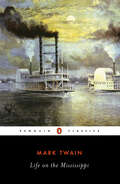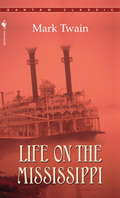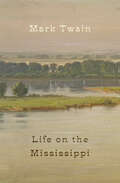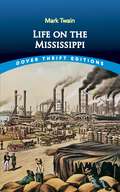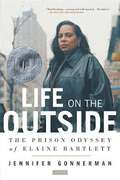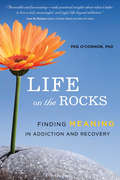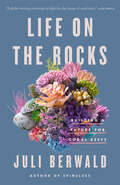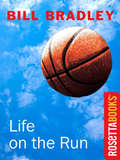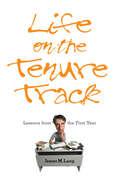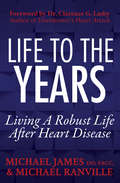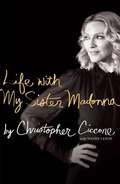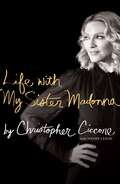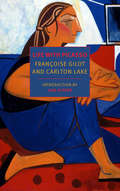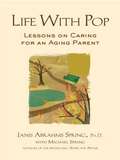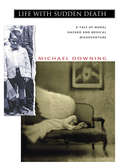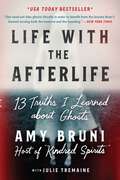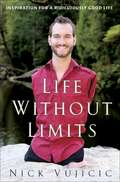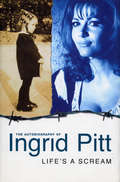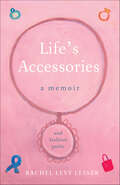- Table View
- List View
Life on the Mississippi
by Mark TwainLife on the Mississippi (1883) is a memoir by Mark Twain of his days as a steamboat pilot on the Mississippi River before the American Civil War, and also a travel book, recounting his trip along the Mississippi from St. Louis to New Orleans many years after the War. The book begins with a brief history of the river as reported by Europeans and Americans, beginning with the Spanish explorer Hernando de Soto in 1542. It continues with anecdotes of Twain's training as a steamboat pilot, as the 'cub' of an experienced pilot. He describes, with great affection, the science of navigating the ever-changing Mississippi River in a section that was first published in 1876, entitled "Old Times on the Mississippi". In the second half, Twain narrates his trip many years later on a steamboat from St. Louis to New Orleans. He describes the competition from railroads, and the new, large cities, and adds his observations on greed, gullibility, tragedy, and bad architecture. He also tells some stories that are most likely tall tales.
Life on the Mississippi
by Mark TwainFashioned from the same experiences that would inspire the masterpiece Huckleberry Finn, Life on the Mississippi is Mark Twain’s most brilliant and most personal nonfiction work. It is at once an affectionate evocation of the vital river life in the steamboat era and a melancholy reminiscence of its passing after the Civil War, a priceless collection of humorous anecdotes and folktales, and a unique glimpse into Twain’s life before he began to write.Written in a prose style that has been hailed as among the greatest in English literature, Life on the Mississippi established Twain as not only the most popular humorist of his time but also America’s most profound chronicler of the human comedy.
Life on the Mississippi: The Authorized Uniform Edition
by Mark TwainA stirring tribute to America&’s mightiest river by one of its greatest authors Before Samuel Clemens became Mark Twain, world-famous satirist and the acclaimed creator of Tom Sawyer and Huckleberry Finn, he trained to be a steamboat pilot on the Mississippi River. In this captivating memoir and travelogue, Twain recounts his apprenticeship under legendary captain Horace Bixby, an exacting mentor who teaches his charge how to navigate the ever-changing waterway. The colorful details of life on the river—from the reversals of fortune suffered by riverboat gamblers to the feuds waged by towns seeking to profit from the steamboat trade—fascinate Twain, and in his hands become the stuff of legend. Years later, as a passenger on a voyage from St. Louis to New Orleans, he vividly describes the stunning changes wrought by the Civil War and the steady advance of the railroads. A valuable piece of history and a revealing look at the origins of a national treasure, Life on the Mississippi is a true classic of American literature. This ebook has been professionally proofread to ensure accuracy and readability on all devices.
Life on the Mississippi: The Authorized Uniform Edition (Dover Thrift Editions: Biography/autobiography Ser.)
by Mark TwainHe was Sam Clemens, steamboat pilot, before he was Mark Twain, famous author. His better-known name originated with the lingo of navigation, and much of his writing was informed by his shipboard adventures on one of the world's great rivers. In this classic of American literature, Twain offers lively recollections ranging from his salad days as a novice pilot to views from the passenger deck in the twilight of the river culture's heyday. Under the tutelage of the most celebrated pilot on the Mississippi, young Twain acquires the skills to navigate a constantly changing riverscape, avoiding potential collisions with other boats and traversing winding channels in the dead of night. The vivid and ever-engaging narrative encompasses tales of riverside town feuds, the professional vicissitudes of a riverboat gambler, dramatic accounts of life in Vicksburg as the city lay under siege during the Civil War, and many other scenes from a now-vanished way of life. These antebellum visions take on a bittersweet cast with the author's postwar return to the region, when railroad competition has largely doomed the commercial steamboat and the old ways of life are passing into history. A testimonial to Twain's repute as the most popular humorist of his day, these reminiscences crackle with comic anecdotes and energetic witticisms. Engrossing and entertaining, this volume will captivate devotees of Twain, steamboat buffs, lovers of Americana, and students of American literature.
Life on the Outside: The Prison Odyssey Of Elaine Bartlett
by Jennifer GonnermanLife on the Outside tells the story of Elaine Bartlett, who spent sixteen years in Bedford Hills prison for selling cocaine--a first offense--under New York's Rockefeller drug laws. The book opens on the morning of January 26, 2000, when Bartlett is set free and returns to New York City. At 42, she has virtually nothing: no money, no job, no real home. All she does have is a large and troubled family, including four children, who live in a decrepit housing project on the Lower East Side. "I left one prison to come home to another," Elaine says. Over the next months, she clashes with her daughters, hunts for a job, visits her son and husband in prison, negotiates the rules of parole, and campaigns for the repeal of the laws that led to her long prison term. Russell Simmons, founder of Def Jam Records, says: "At a time when the prison-industrial complex is destroying African American families and neighborhoods, Elaine Bartlett is more than a survivor: she is a heroine. The future of our communities depends on women like her." Life on the Outside is a 2004 National Book Award Finalist for Nonfiction.
Life on the Rocks
by Peg O'ConnorAddiction and recovery are, at their core, about the meaning of life. Life on the Rocks is the first book to address addiction and recovery from a Western philosophical perspective, offering a powerful set of tools sharpened over millennia. It introduces some of the core concepts and vexing questions of philosophy to help addicts and those affected by their addiction examine and perhaps transform the meaning they make of their lives.Without assuming any familiarity with philosophy, Dr. O'Connor illuminates issues all addicts and their loved ones face: self-identity, moral responsibility, self-knowledge and self-deception, free will and determinism, fatalism, the nature of God, and their relations to others. Life on the Rocks is an indispensable guide to the deeply philosophical concerns at the heart of every addict's struggle.Peg O'Connor, PhD, is professor of philosophy and gender, women, and sexuality studies at Gustavus Adolphus College in Minnesota. She is the author of the popular Psychology Today blog "Philosophy Stirred, Not Shaken" and contributor to the Pro Talk series at Rehabs.com.
Life on the Rocks: Building a Future for Coral Reefs
by Juli BerwaldThe story of the urgent fight to save coral reefs, and why it matters to us allCoral reefs are a microcosm of our planet: extraordinarily diverse, deeply interconnected, and full of wonders. When they&’re thriving, these fairy gardens hidden beneath the ocean&’s surface burst with color and life. They sustain bountiful ecosystems and protect vulnerable coasts. Corals themselves are evolutionary marvels that build elaborate limestone formations from their collective skeletons, broker symbiotic relationships with algae, and manufacture their own fluorescent sunblock. But corals across the planet are in the middle of an unprecedented die-off, beset by warming oceans, pollution, damage by humans, and a devastating pandemic.Juli Berwald fell in love with coral reefs as a marine biology student, entranced by their beauty and complexity. Alarmed by their peril, she traveled the world to discover how to prevent their loss. She met scientists and activists operating in emergency mode, doing everything they can think of to prevent coral reefs from disappearing forever. She was so amazed by the ingenuity of these last-ditch efforts that she joined in rescue missions, unexpected partnerships, and risky experiments, and helped rebuild reefs with rebar and zip ties.Life on the Rocks is an inspiring, lucid, meditative ode to the reefs and the undaunted scientists working to save them against almost impossible odds. As she also attempts to help her daughter in her struggle with mental illness, Berwald explores what it means to keep fighting a battle whose outcome is uncertain. She contemplates the inevitable grief of climate change and the beauty of small victories.
Life on the Run (Transaction Large Print Ser.)
by Bill BradleyThis classic memoir about life in the pros by the NBA hall of famer and former US senator was named a top 100 Sports Books by Sports Illustrated. Before Bill Bradley became known as a US senator and presidential candidate, he was famous for being a part of the world championship–winning New York Knicks. Now, long after his athletic and political careers have come to a close, his account of twenty days in a pro basketball season remains a classic of sports literature, unparalleled in its honesty and intelligence. Told with incredible candor, Bradley shows life on the road as a pro-athlete for what it is: a sometimes glamourous, often lonely journey. He takes readers from the court to the locker room; from the seamless teamwork of a winning game to the melancholy of a motel in a strange city. Bradley shows us the abuse of the press alongside the smothering adoration of the fans. We watch in horror as Earl Monroe is beaten outside Madison Square Garden barely an hour after twenty thousand people cheered him. And we come to understand the euphoria and exhaustion, the icy concentration and intense pressure, that are felt only by those who play basketball for keeps. &“A remarkable, searching, smart book.&” —Newsweek
Life on the Tenure Track: Lessons from the First Year
by James M. LangIn this fast-paced and lively account, Jim Lang asks—and mostly answers—the questions that confront every new faculty member as well as those who dream of becoming new faculty members: Will my students like me? Will my teaching schedule allow me time to do research and write? Do I really want to spend the rest of my life in this profession? Is anyone awake in the backrow?Lang narrates the story of his first year on the tenure track with wit and wisdom, detailing his moments of confusion, frustration, and even elation—in the classroom, at his writing desk, during his office hours, in departmental meetings—as well as his insights into the lives and working conditions of faculty in higher education today. Engaging and accessible, Life on the Tenure Track will delight and enlighten faculty, graduate students, and administrators alike.
Life to the Extreme: How a Chaotic Kid Became America’s Favorite Carpenter
by Ty PenningtonTy Pennington shares stories from his life and offers a behind-the-scenes look at your favorite home shows!As a kid, Ty Pennington had too much energy. He was chaotic, bouncing off the walls, and on a first-name basis with the local emergency room staff. Back then there wasn't public awareness of attention deficit disorder yet. People just thought Ty was rambunctious. A trouble maker. What do you do with a kid who just can't sit still? Who can't focus?But Ty discovered something amazing when he was just a boy: he felt focused when he was building something. He discovered that he loved to work with his hands - to use tools and be creative. He loved to try new things, build and design new things.In Life to the Extreme Ty shares his remarkable life story. In his characteristic humorous style, he takes you racing through his life with ADHD-infused diversions that will make you laugh out loud. He shares about how he was diagnosed with ADHD in college, and what it has meant to be an advocate for ADHD awareness. He shares about his start as a model and carpenter, and his eventual move to television where he starred in the hit shows Extreme Makeover: Home Edition and Trading Spaces.Life to the Extreme will inspire you. Ty's boundless energy and his sense of humor are infectious. You'll laugh. You might cry a little. And you'll definitely be inspired to change the lives of those around you.
Life to the Limit
by Bev BrockAt 22, Bev Brock dived into shallow water and broke her neck. She was told she'd never walk freely again. A few months later she was out dancing in a neck brace, and playing basketball the day the brace cameoff. Bev Brock does not break easily. After enduring more than her fair share of ups and downs - including the heartbreaking public separation from racing-car legend Peter Brock, and the messy legal battle that left her flat broke - Bev continues to celebrate life with inimitable wit, warmth, honesty and optimism. Life to the Limit is her story, and a lesson in not just coping with crises but in turning adversity into triumph.
Life to the Years: Living a Robust Life After Heart Disease
by Michael James Michael RanvilleA cardiologist and his patient tell a true story of surviving and thriving, in a book both informational and inspirational. After Michael Ranville&’s emergency treatment, his cardiologist told him: Given the nature and severity of your heart attack, you should no longer be with us. Statistically, you are dead. Now, the doctor and patient unite to present a unique story for the benefit of heart patients—or anyone who has a heart. A generation ago, heart patients rarely defied the statistical category that dictated a sedentary existence and an abbreviated life. But this is the tale of one patient who didn&’t die. He continued to live, refused to take up membership in that statistical category. Under the thirty-year care of Dr. Michael James and a forward-leaning cardiac community, Michael Ranville and a host of other determined heart patients created a new statistical category. Life to the Years is also the lively, anecdote-laden story of a tenacious and resourceful cardiologist who helped Ranville seize control of life after heart disease. The authors illustrate the development of life-saving technology with fascinating stories that underscore the human element that still drives medicine. Life to the Years does not shy from the controversial, from the uncomfortable. A confrontation with mortality is the inevitable companion of heart disease. For the authors, the significance of dignity when faced with death—for both family and patient—is far from a theoretical discussion. This is a memoir that will both enlighten and encourage, and offer a behind-the-scenes look at a successful doctor-patient relationship.
Life with Jackie
by Irving Mansfield Jean Libman BlockJackie Susann was a beautiful lady and a great theatre artist. She got everything she wished but not a long life. Her husband talks about his life with Jackie and how much she meant to him in life.
Life with Lindsay and Crouse
by Cornelia Otis SkinnerFrom the Jacket: Whimsically funny, gentle, and generous to a fault, Howard Lindsay and Russel Crouse laid to rest forever the claim that nice guys finish last. They were the most successful team of playwrights in the history of the American stage. And in this double portrait their story is told by a gifted writer who is also one of the great ladies of the theatre. From their first collaboration on Anything Goes! in the mid 1930's, the names of Lindsay and Crouse were synonymous with great hits: Arsenic and Old Lace, State of the Union, Call Me Madam, The Sound of Music and, of course, Life with Father - the longest- running play in the annals of Broadway. Cornelia Otis Skinner's biography offers glimpses of such famous figures as Irving Berlin, Alexander Woollcott, Eugene O'Neill, Frank Sullivan, the Lunts, the Round Table Group, Ethel Merman, and Bob Hope. Around them bubble marvelous anecdotes of Broadway and the boondocks, by turns tart, endearing and hilarious. As Brooks Atkinson observes in his foreword, Howard Lindsay and Russel Crouse "loved the vitality and variety of theatre people and the excitement and insanity of the theatre's business methods. Miss Skinner also reminds us that in and out of the theatre they were thoroughbreds."
Life with My Sister Madonna
by Christopher CicconeChristopher Ciccone's extraordinary memoir is based on his forty-seven years of growing up with, working with, and understanding the most famous woman of our time, who has intrigued, scandalized, and entertained millions for 50 years.
Life with My Sister Madonna
by Christopher Ciccone Wendy LeighMadonna up close, by the brother who knows her better than anyone. Christopher Ciccone's extraordinary memoir is based on his forty-seven years of growing up with, working with, and understanding the most famous woman of our time, who has intrigued, scandalized, and entertained millions for half a century. Through most of the iconic star's kaleidoscopic career, Christopher played an important role in her life: as her backup dancer, her personal assistant, her dresser, her decorator, her art director, her tour director. If you think you know everything there is to know about Madonna, you are wrong. Only Christopher can tell the full scale, riveting untold story behind Madonna's carefully constructed mythology, and the real woman behind the glittering façade. From their shared Michigan childhood, which Madonna transcended, then whisked Christopher to Manhattan with her in the early eighties, where he slept on her roach-infested floor and danced with her in clubs all over town -- Christopher was with her every step of the way, experiencing her first hand in all her incarnations. The spoiled daddy's girl, the punk drummer, the raunchy Boy Toy, Material Girl, Mrs. Sean Penn, Warren Beatty's glamorous Hollywood paramour, loving mother, Mrs. Guy Ritchie, English grande dame -- Christopher witnessed and understood all of them, as his own life was inexorably entwined with that of his chameleon sister. He tangled with a cast of characters from artist Jean-Michel Basquiat, to Gwyneth Paltrow, Kate Moss, Demi Moore, and, of course, Guy Ritchie, whose advent in Madonna's life splintered the loving relationship Christopher once had with her. The mirror image of his legendary sister, with his acid Ciccone tongue, Christopher pulls no punches as he tells his astonishing story. Life with My Sister Madonna is the juicy, can't-put-it-down story you've always wanted to hear, as told by Madonna's younger brother.
Life with Picasso
by Carlton Lake Françoise GilotFrançoise Gilot's candid memoir remains the most revealing portrait of Picasso written, and gives fascinating insight into the intense and creative life shared by two modern artists.Françoise Gilot was in her early twenties when she met the sixty-one-year-old Pablo Picasso in 1943. Brought up in a well-to-do upper-middle-class family, who had sent her to Cambridge and the Sorbonne and hoped that she would go into law, the young woman defied their wishes and set her sights on being an artist. Her introduction to Picasso led to a friendship, a love affair, and a relationship of ten years, during which Gilot gave birth to Picasso’s two children, Paloma and Claude. Gilot was one of Picasso’s muses; she was also very much her own woman, determined to make herself into the remarkable painter she did indeed become.Life with Picasso, written with Carlton Lake and published in 1961, is about Picasso the artist and Picasso the man. We hear him talking about painting and sculpture, his life, his career, as well as other artists, both contemporaries and old masters. We glimpse Picasso in his many and volatile moods, dismissing his work, exultant over his work, entertaining his various superstitions, being an anxious father. But Life with Picasso is not only a portrait of a great artist at the height of his fame; it is also a picture of a talented young woman of exacting intelligence at the outset of her own notable career.
Life with Pop
by Janis Abrahms Spring Michael SpringFrom bestselling author and clinical psychologist Janis Abrahms Spring comes a refreshingly honest and tender portrait of a devoted daughter caring for her father through his final years of life After her mother died, Janis Abrahms Spring "inherited" her father-Pop- and set off on an all-consuming five-year mission to make his days as rich and comfortable as possible. This is their story, overflowing with humor, insight, and love. In beautifully crafted vignettes, spring brings their deepening relationship to life-both the joy and the imposition, the happiness and the heartaches. From her unique perspective as a clinical psychologist, Spring explores the emotional and practical complexities of parenting a parent. Inspiring, deeply moving, and frank, Life with Pop is an ultimately comforting meditation on a universal experience, as well as a book with profound lessons on how to grow old gracefully.
Life with Sudden Death: A Tale of Moral Hazard and Medical Misadventure
by Michael DowningThe youngest of nine children, Michael Downing was three when his father died - suddenly and inexplicably. No autopsy was performed. The family diagnosis was God's will.As a boy, Downing rigorously trained as a spiritual athlete, preparing to vault into heaven. But eventually he escaped the religious dogma, and the family arena - until one of his brothers died in 2003, suddenly and inexplicably. No autopsy was performed.Alarmed, Downing pursued a diagnosis: Drawn into a world of researchers, clinicians, and manufacturers with their own arcane ethics and faith, Downing discovered he had inherited a mutant protein from his father, and the first symptom would be his sudden death. To save his life, a defibrillator was hard-wired to his heart. Within weeks, he needed emergency surgery to remove the device and the life-threatening infection he got with it. Two months later, he was re-implanted - only to read in his morning newspaper that the new wires anchored to his heart were prone to failure. His device might be powerless, or it might deliver a series of unwarranted, possibly fatal, shocks. From a bedeviled boyhood in the Berkshires to a grim comedy of errors in one of Boston's best hospitals, Life with Sudden Death is a wild ride.
Life with a Sprinkle of Glitter
by Louise PentlandYouTube star Sprinkle of Glitter, also known as lifestyle and beauty vlogger Louise Pentland, offers a delightful guide to finding happiness and sprinkling positivity into every area of your life, from nights out with your friends to the trinkets you display on your vanity.Aloha Sprinklerinos! Louise Pentland leads a very happy life. That's because she chooses to. Sure, she has dark and dreary days. But, as she has come to understand, the joy is all in your perspective. Happiness is not measured in size but in significance. On her wildly popular YouTube channel, Sprinkle of Glitter, Louise talks a lot about changing the way we think. Her motto? Happiness is there for everyone: you just have to choose to face everything with a smile and positivity. It's not just about the big things either--it's about the tiny, intangible moments that make up the course of a lifetime and how to live that lifetime to the absolute fullest. This book is like one of those glorious vintage shops where every surface is laden with treasure: cut glass, pill boxes, old cameras, pendants, and chests of drawers. Each chapter is a gem-encrusted tin that you can peep inside to discover fun topics such as glitz (beauty and pampering, traveling in style) and creativity (crafting, prettifying your room), to tougher topics such as bullying and body confidence, to the universal topic of love (dating, bonding with baby, being kind). Whether you take in tiny bits at a time or devour the book all in one go, Louise shares how she has learned to enrich her life, and you can too...with just a Sprinkle of Glitter. Toodlepip!
Life with a Sprinkle of Glitter
by Louise PentlandTHIS IS MY FIRST EVER OFFICIAL BOOK!Aloha Sprinklerinos!Imagine you are in one of those glorious vintage shops where every surface is laden with treasure.Cut glass, pill boxes, old cameras, pendants, chests of drawers and stacks and stacks of books. This book is like that. Each chapter is one of those gem encrusted tins that you can open, peep inside and enjoy. You can either methodically wander the entire shop, looking at each individual item in order, or, you can dance around with wild abandon, opening and closing whatever you like, whenever you like.You can take in tiny bits of it at a time or you can devour it all in one go. I don't mind. I don't mind how you go about it; all that matters to me is that you take something from it.Divided into four sections: Glitz, Create, Need to Knows and All About Love, you'll find all my little tips and tricks, stories and insights and nuggets of advice.I want you to walk away from this book feeling uplifted. I want you to feel as though you are equipped to deal with something in your life and deal with it in the best possible, positive way. I want to show you how I find so much joy and enrichment in my life and how you can do it too, with just a Sprinkle of Glitter...Toodlepip!Xxx
Life with the Afterlife: 13 Truths I Learned about Ghosts
by Amy BruniStar of Kindred Spirits and paranormal investigator Amy Bruni shares stories from her years of experiences with ghosts, organized around thirteen truths that guide her approach to the supernatural. Amy Bruni, co-star of Kindred Spirits and one of the world's leading paranormal investigators, has learned a lot about ghosts over her years of research and first-hand experience. Now, in Life with the Afterlife, she shares the insight she has gleaned and how it has shaped her unique approach to interacting with the spirits of the dead and those who encounter them. From her earliest supernatural encounters as a child, through her years appearing on Ghost Hunters and the creation of her company Strange Escapes, which offers paranormal excursions to some of America's most notoriously haunted destinations, and into her current work on The Travel Channel's Kindred Spirits, this book is full of astonishing and deeply moving stories of Amy's efforts to better understand the dead but not yet departed. With Amy's bright humor and fierce compassion for both those who are haunted and those who are haunting, Life with the Afterlife is an eye-opening look at what connects us as people, in life and beyond.
Life without Limits: Inspiration for a Ridiculously Good Life
by Nick VujicicLife Without Limits IS AN INSPIRING BOOK BY AN EXTRAORDINARY MAN. Born without arms or legs, Nick Vujicic overcame his disability to live an independent, rich, fulfilling life, becoming a model for anyone seeking true happiness. Now an internationally successful motivational speaker, Nick spreads his central message: the most important goal for anyone is to find their life's purpose despite whatever difficulties or seemingly impossible odds stand in their way. Nick tells the story of his physical disabilities and the emotional battle he endured trying to deal with them as a child, a teen, and a young adult. "For the longest, loneliest time, I wondered if there was anyone on earth like me, and whether there was any purpose to my life other than pain and humiliation." He shares how his faith in God has been his central source of strength and explains that once he found his own sense of purpose--inspiring others to make their lives and the world better--he found the confidence to build a rewarding and productive life without limits. Nick offers practical advice for realizing a life of fulfillment and happiness by building trust in others, developing supportive relationships, and gaining strength for the journey. He encourages the reader by showing how he learned to accept what he could not control and focus instead on what he could.
Life's A Scream
by Ingrid PittAt the age of five, Ingrid Pitt found herself in a concentration camp. Ingrid and her mother escaped from the guards while on a forced march and presented themselves to the partisans, unsure if they would kill them. They spent the rest of the war in the forests. Ingrid fell in love for the first time and watched in despair as British bombers flew overhead. She still cannot see the vapour trials of planes without being transported back to her childhood vigil. After the war Ingrid came to London, where she developed a career as a Hammer House of Horror movie star, but, as she proundly says, `I was always the biter, never the bitten!' She also acted in mainstream films, such as WHERE EAGLES DARE. She had a child by her first marriage and a grand passion which lead to her marrying a racing driver. They lived in Argentina for a while and were good friends of President Peron and Isabelits Peron. Ingrid even spent an evening with the embalmed body of Eva Peron. Written with great passion and warmth, this is a rare childhood memoir and the story of Hammer`s most galmorous actress. Above all, this is a story of a survivor.
Life's Accessories: A Memoir (and Fashion Guide)
by Rachel Levy LesserRachel Levy Lesser can relive almost every significant life event through an accessory. A scarf, a pair of earrings, a bag, even a fleece pair of socks—each contains the elements that put together the story of a life. Life’s Accessories is a funny, sad, touching, relatable, shake-your-head-right-along-as-you-laugh-and-wipe-away-tears, coming-of-age memoir. In fourteen essays, Lesser tackles sensitive issues like anxiety, illness, and loss in a way that feels a bit like having a chat with a good friend. Out of the stories comes solid life—and fashion—advice. About far more than just a hair tie, a bracelet, or a belt, Life’s Accessories is a window into the many ways in which Lesser has come to understand life—in all of its beauty, its joys, its sorrows, its heartaches, its challenges, and its absurdity.
